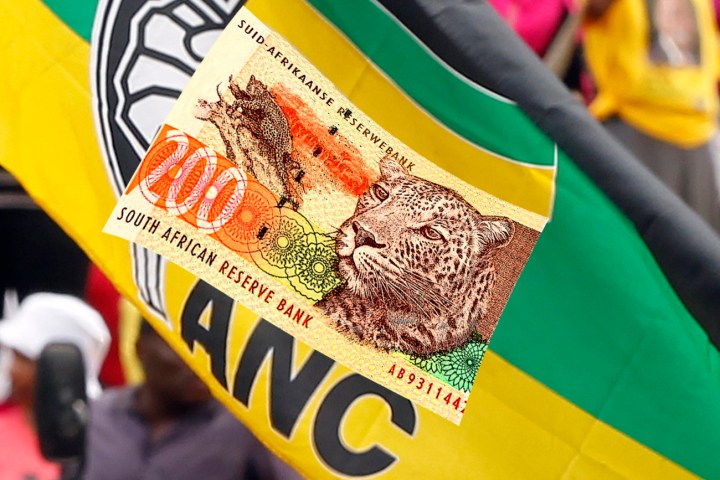Politics, South Africa
Fighting shadows: How money corrupts the ANC – and its plan to stop it

Because of the ANC’s ubiquity in South African politics, it would be foolhardy to ignore a document that assesses the health of its internal democracy, since that reflects the country’s democracy as a whole. Judging from the party’s most recent assessment, democracy’s been bedevilled, and money is at the root of the evil. By OSIAME MOLEFE.
You’d be wrong to portray the ANC as a hard-headed organisation that is stuck in the past and unwilling to see the error of its ways. It may not take kindly to external or public criticism, as evidenced by its response to businessman Reuel Khoza’s comments, but the recently released organisational renewal policy document reveals an organisation engaged in honest self-reflection in a desperate attempt to avoid the mistakes made by other liberation movements on the continent.
Parts of the document are reminiscent of Harvard law professor Lawrence Lessig’s book, Republic, Lost, albeit with less vivid imagery and more turgid language. In the book, Lessig warns about how campaign financing and lobby groups have usurped America’s democracy. So dastardly has been the sleight of hand that it has happened within the rules of democracy, mostly.
In calling “for the rebirth of the ANC”, the document – one of several others to be discussed at the party’s June policy conference and possibly adopted at the December national conference – warns that the ANC may be in the throes of a similar evil threatening its internal processes. It suggests the ANC is engaged in a battle for its soul against “new tendencies” and a “shadow culture which co-exists alongside the movement’s own organisational culture. These tendencies draw on ANC history and symbolism and like a parasite, use the membership, and the very democratic structures and processes of the movement to its own end”.
One of the ways these tendencies have usurped the ANC’s democratic processes is in the influence of money in lobbying for position within the party. The influence ranges from creating secretive structures parallel to those of the party by funding lobby groups’ organising activities to bribing members and manipulating membership systems to influence the outcome of leadership contests.
The ANC Youth League in the Western Cape, for example, alleged during its chaotic elective conference in December 2011 that leaders within the party’s provincial executive and certain wealthy businessmen had been in cahoots to create Youth League “ghost branches”. It costs R10 to join the league and 100 members constitute a branch. Once formed, these ghost branches became eligible to influence elective conferences, a league NEC member said.
Regardless of the veracity of the claims, they illustrate why the document cites money, lobbying and these secretive parallel structures as a subset of the internal strife and factional battles for power that have come to dominate political life within the ANC. This domination of factional battles in turn has become one of three organisational weaknesses the party faces, the document says. By implication, the country faces the same weaknesses, too, for as long as the party maintains its dominant position in politics.
The Western Cape ANCYL’s allegations were not the first time the notion of ghost members and branches arose within the party. In his report to the party’s 2002 national congress, then secretary-general Kgalema Motlanthe said an audit had revealed problems with ghost members. But despite the further audits and safeguards the party put in place, the subversion of the party’s internal democracy through “buying” leadership positions continues today.
The 2010 national general council leadership renewal document asks: “What about monies raised by candidates and lobby groups, with no accountability and disclosure about the sources (and legality) of such resources, nor how these monies are being used? Are we already in the trap of vested interests and those with money having more influence about the direction of the ANC than its membership?”
After much reluctance and handwringing, the party has in recent years taken on the issue of funding, not only of internal contestations, but also how it finances its own operations and how the country’s political organisations fund themselves.
“We need to develop new methods of achieving financial sustainability that are transparent, ethical, lawful and predictable,” the renewal document says, presumably because this has not been always the case. The party’s investment arm, Chancellor House, has hardly been a bastion of transparency, nor have the methods the party used to finance itself been above reproach.
Most recently, it was revealed that the Batho Batho Trust, of which the ANC is the sole beneficiary, held a 51% interest in Thebe Investments, Shell SA’s empowerment partner in its controversial proposal to “frack” for shale gas in the Karoo. As the decision of whether fracking would go ahead effectively lay in ANC hands, the opposition DA has raised the flag on the credibility and ethics of the proposal.
However, whether coming from within or from civil society and opposition parties, the warnings so far have been blighted by the Cassandra syndrome. Either disbelieved or perceived as not as significant as suggested, the threats have not been met by effective proposals to counter them, until now.
The organisational renewal document proposes developing guidelines on lobbying and structures to enforce the guidelines, adding criteria for leadership into its electoral rules to weed out unsuitable candidates, and having all electoral conferences operate on a set of standardised rules and guidelines.
It also proposes establishing a permanent electoral commission to oversee the election process, from screening nominees to managing elections. The commission would be manned by party veterans not vying for leadership positions and whose conduct has been above reproach. None of the proposals is particularly groundbreaking but, if implemented, could be a victory on the party’s path to reclaim its soul.
On the ANC’s financing, the relevant NEC committee has been given the task of convening a strategy session to discuss a comprehensive plan to ensure the party’s financial sustainability. As has been the case, the party is partial to growing (for itself and other parties) funding sourced from public sources to obviate dependence on mysterious private sources, who usually return for their pound of flesh.
The document says the success of these plans rests on a resilient, courageous and principled leadership – a potentially worrying prospect because some, including the ANC’s alliance partners, have found the ANC sorely lacking in this regard. DM
Read more:
- Analysis: Will the ANC seriously consider party funding this year?, in Daily Maverick.
Photo: The ANC and money – an uncomfortable alliance.





 Become an Insider
Become an Insider